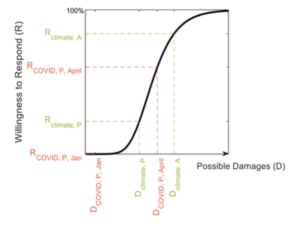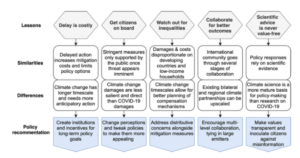INSIGHT by David Klenert, Economist, European Commission | Franziska Funke, Writer, Vox EU | World Economic Forum
〉COVID-19 and climate change share a similarity in that by acting early we can avoid the most catastrophic effects, write two academics.
〉We already have many of the technologies and economic instruments that are needed to progress on climate action.
〉There are ways to overcome the dual challenges of political will and public support.
| In the early days of the pandemic, many political leaders had the tendency to delay decisive policy action until it seemed inevitable. When confronting viral outbreaks or climate change, however, policy procrastination can be tragic. The spread of COVID-19 and the changes in our climatic system are ruled by non-linear dynamics. That means that delayed responses get disproportionately more expensive: in the US, starting social distancing one week earlier could have avoided an estimated 55% of deaths (36,000) between mid-March and early May (Pei et al. 2020). According to Furman et al. (2015), the costs of later climate action increase by 37% when delayed until 2025.
However, politicians cannot be blamed alone for initial policy paralysis. At least in democratic systems, the action space of policymakers is always constrained by the support of the public. We, the public, however, are psychologically ill-equipped to understand the gravity of abstract threats like climate change. The virus, abstract in the beginning when it seemed still confined to the city of Wuhan, has meanwhile succeeded to capture our imaginations: once the threat of contracting COVID-19 seemed imminent, people accepted harsh limitations on their liberties. Climate change has thus far failed to attract a similar level of alertness. Indeed, what society is willing to do seems to depend crucially on how ‘bad’ we think it will get (see Figure 1).
Figure 1 Potential relationship between perceived damages of COVID-19 and climate change and society’s willingness to respond.

| Climate change is harder to defeat politically, although easier to tackle economically
On balance, there are reasons to believe that climate change will be even harder to defeat than the COVID-19 pandemic. We will probably resume some semblance of normalcy in a post-pandemic world once an effective vaccine and treatment protocol have emerged. Stabilising the climate, however, requires more lasting transformations that need to be implemented long before climate change reaches catastrophic dimensions.
On the bright side, while these transformations would last longer, they would not be as disruptive to the economy: the IMF (2020) predicts a 4.9% contraction of the global economy in 2020, while the European Commission assumes that GDP in the euro area will even drop by 8.7%. In comparison, a 0.06% reduction in annual global consumption growth over this century that will be compromised for achieving the Paris Agreement (IPCC 2014) seems negligible. Yes, economists are currently asking to direct huge sums of tax money from the COVID-19 economic stimulus packages into climate-friendly investments, but in the long-run many of those measures may pay for themselves. In a recent survey, economic experts demonstrated how certain green policies could outperform conventional stimulus packages in getting pandemic-ridden economies back on track (Hepburn et al. 2020).
What this shows is that we already have many of the technologies and economic instruments that are needed to progress on climate action. The real bottleneck is political will and public support.
| Which future for climate policy?
To overcome short-termism and policy procrastination, societies can delegate decision-making to institutions that are better aligned with long-term policy goals than politicians on a re-election mission. The UK Expert Committee on Climate Change is such an example. Some experts have even proposed ‘Carbon Central Banks’ (Helm et al. 2003).
Information campaigns and the media need to do a better job at psychologically conveying the threat of climate change to the public. For example, they can turn to attribution science: initiatives such as ‘World Weather Attribution’ can now demonstrate the role of climate change in extreme weather events as we are experiencing them.
Perhaps most importantly, though, policymakers need to ensure that mitigation measures are designed such that they take account of citizens’ concerns: The electorate will only support ambitious carbon pricing and low-carbon investment initiatives when they feel that the costs and burdens of climate change mitigation are fairly distributed (Maestre-Andrés et al. 2019). Insulating highly affected communities and low-income households from exorbitant price hikes and making the benefits of climate reform visible can harness support and avoid public opposition (Klenert and Hepburn 2018).
However, one thing is crucial for many of these solutions to emerge: overcoming the politicisation of climate change. Many measures against COVID-19 were only successful because they build on a platform of broad cross-partisan support. Harnessing support for climate change across political divides, such as the recent US Bipartisan Climate Roadmap, is crucial. It is equally important to get disgruntled climate sceptics and those led astray by misinformation back on board. It will be interesting to see what role public engagement and deliberative democracy can play: Citizens’ Assemblies on Climate Change, as in the UK and France, may prove vital for building a strong and lasting social mandate for more ambitious climate action (Howarth et al. 2020).
Figure 2 Five lessons from the COVID-19 pandemic for the future of climate change mitigation.

| Pandemic politics as a precedent for climate activists?
Eventually, the current pandemic might culminate in exactly the change in political culture needed to progress on climate action. The current restrictions on personal and economic liberties are unprecedented to most generations in Western countries, as are the funds mobilised to remediate the economic effects of the pandemic response. COVID-19 has shown what is possible once there is enough political will. In a post-pandemic world, will politicians still get away with decrying the demands of climate activists as unrealistic? The new generation of climate strikers will give policymakers a much harder time to dismiss ambitious mitigation proposals, such as a fast-tracked coal phase-out or stringent carbon pricing, on the basis of them being too much of a burden on the economy. Chances are the next wave of climate action will also be bigger still.
| Authors’ Note: This column is based on our recent publication, Klenert et al. (2020). The views expressed are purely those of the authors and may not be interpreted as representing an official position of the European Commission.
| All opinions expressed are those of the author. investESG.eu is an independent and neutral platform dedicated to generating debate around ESG investing topics.








